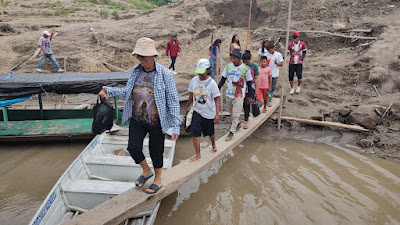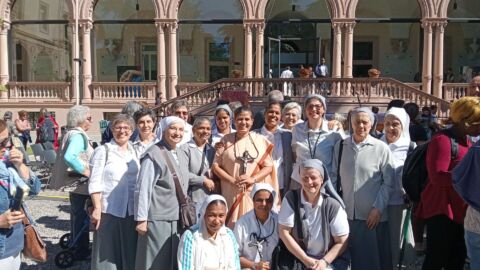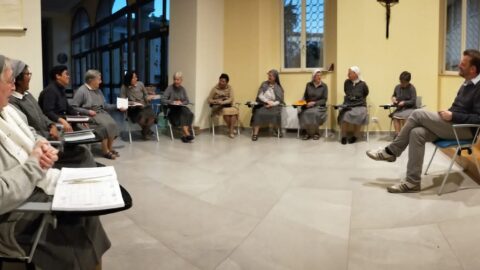Sister Suzanne Djebba, a Cameroonian and Missionary Sisters of the Immaculate in Guinea-Bissau for about eight years, shared her experience at the international missionary conference organized on the occasion of the Jubilee of the Missionary World, held on October 4-5. Below is a summary of her speech.
My first missionary invitation in Guinea Bissau
One day, as a religious community, we were supposed to attend a meeting to plan for the pastoral year in our sector, and to get there we had to take a boat. When we reached the shore, stepping off the boat, I heard a young man calling: “Come and eat.” At first, I didn’t even know where the voice was coming from, so I just turned around out of curiosity, but also to see who was really inviting me. I, however, assumed it wasn’t meant for me because I was new, just arrived, and no one else knew me, other than my fellow sisters. Yet, the boy continued calling, pointing at me and saying he was actually calling me.I’d say that, even though I’m African and know that sharing is natural, I was still surprised and even touched by his gesture. I didn’t know this guy at all, and he certainly didn’t know me.What remains of this first experience? I’m left with a warm invitation, a vibrant call to enter into the communion of a people who, even without knowing me, were already waiting for me, a people who didn’t care if I was new, if I was a foreigner, a woman, or if I belonged to one religion or another, but who addressed me only a simple invitation: “Come…” It’s as if they were calling me to always be with them to live the mission fully, not as a spectator, but immersed in their midst as if sent by God and, at the same time, invited by them to be part of their lives and enter their world to make it mine too.
Collaboration with the Local Church
The invitation I received immediately made me realize that for me, communion meant working for the Church and with the Church. For us new missionaries today, when we arrive in mission, the reality is very different because we already find a fairly well-structured and functioning local church. Therefore, we don’t arrive to start the Church’s planting in that particular place from scratch, but rather to strengthen its presence and give it a more missionary face. This, however, requires the ability to stand alongside others, not as heroic protagonists in the front, nor as passive and critical spectators in the back, but side by side, hand in hand, working together as an ecclesial body. For me, this has been the fundamental attitude I have tried to embody in my life in mission.The icon that has always accompanied me is that of Jesus walking with the disciples of Emmaus, who enters into dialogue with them, mindful of their concerns, gradually helps them understand God’s plans, and disappears once their eyes are opened at the breaking of the bread. For me, working with the local Church means concretely experiencing this journey together, which translates into sharing faith, formation, and the gifts received from the Lord. Another image that accompanies me is that of Jesus, seed and sower, a very dear image to my Institute: this generous and tireless sower who casts seeds everywhere, regardless of place or location, is precisely the driving force behind my daily missionary work.
In my first years of mission in Guinea, the greatest challenge was formation of formators for religious life. In my first year, I worked alongside a Consolata Sister: a truly enriching experience that allowed me to experience the beauty of contributing to the formation of formators, sharing with them the joys and struggles in the areas where human and academic resources are very limited. In my second year, I found myself alone, and the task was too much for me. We created a group of formators already present on site, who are still carrying out the formation work till today. For me, this is a source of joy and hope, because it concretely expresses the Church’s commitment to the care and formation of local vocations.
The Mission of Listening
In mission, there’s always urgency, or rather, the temptation to work hard and, at times, even frenetically, because needs usually outweigh our strengths. The call I received from young people and women was to give them time to listen. Like other missionaries, I too, in the early days, saw that there was too much practical work and that listening was a very slow path to achieve my goals. It was easier to do something for others than to spend time with them and truly understand what was best for them.What made me change my perspective? Simply a woman who, one day, asked me a critical question: “You missionaries, why don’t you let us express our joy?” She responded by saying that missionaries do everything for themselves, but they don’t open themselves to receive what the people give them as an expression of their gratitude. This brief conversation made me understand, that only through listening I could have this space to give and receive. From that moment on, I understood that mission isn’t just about giving and doing, but also about receiving. I can say without exaggeration that, by listening to people, I received more than I gave. Through listening, I understood what the people truly needed: their own well-being, not the good I thought I was doing for them and, at times, in their place.The image of Mary, the woman who listens, has helped me greatly in my mission. Listening to people as Mary would have listened to them, listening as Mary listened to her son Jesus at every stage of his life, listening to share the depths of another’s heart, their intimate treasure, experiencing God’s trust. One day, an elderly woman came to our community asking for financial help. I sat down next to her, and she immediately began sharing her life with all its difficulties. But what amazed me was that, when she finished speaking, she didn’t ask for anything else. She simply said, “Thank you for listening to me.” Times dedicated to listening are moments where, through dialogue and interpersonal relationships, hope is born, the joy of being taken seriously, valued, and listened to. For me, bringing those I listen to Jesus in the Eucharist is a powerful moment where I feel that it is God himself who is working and we are merely his collaborators.
Other aspects of the mission
Social promotion: Through education, namely schools, we strive to provide a high-quality education. We have chosen a self-managed school system that involves the state, the village, and ourselves. We also prioritize human development and financial support for young people pursuing university and professional studies. After years of commitment and sacrifice, we finally see them becoming financially independent. Some of the young people we have helped are, in turn, paying for the schooling/vocational training of other young people who are not necessarily members of their families. For me, this is a great sign of hope: seeing the good multiply.
Proclamation and witness: Proclamation, as I experienced it in Guinea, was made through catechesis, in which there is no escape from the dialogue between faith and culture, between faith and local traditions. We also value the training of catechists because, often, they reach places we cannot; they know how to use the local language to make things clear.
Sowers of peace and justice: In a country marked by wars and several coups d’état, the entire Church is aware of this precious gift and works to preserve it. Bishops, priests, religious, and all Christians work daily to promote communion, dialogue between individuals and communities, and friendship among all. In Guinea, Muslims, practitioners of traditional religion, and Christians all live together and sometimes even belong to the same family.
Conclusion
For me, mission is presence, a presence, sometimes discreet and silent, but one that profoundly impacts people’s lives. A presence that, at times, also requires words to express and share what we believe in, a presence that keeps us company and shares the joys and hopes of the people to whom we have been sent.














